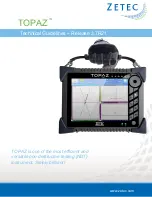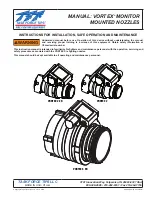
Menu
Room CO
Status
Aux
Flue1
Flue 2
C165
Com Test
Exch Test
BLOWER ON
NAT GAS
CO 0p
O2 20.0%
XAIR 02++%
TIME 60
Prs/Temp
DRAFT & STATIC PRESSURE TEST
T2 T1
P1 P2
Menu
Room CO
Status
Aux
Flue1
Flue 2
C165
Com Test
Exch Test
Prs/Temp
PRS 0.04i
i= inH20
T1 167,1F
T2 104.3F
T 62.8F
Rotate the selector dial to
Pressure/Temperature.
Press
”Pump” to ZERO
(0) pressure sensor.
Connect true draft hose to PI.
Connect to P2 for differential.
Place probe tip in stack to
measure draft.
Connect static pressure hose
for measure differential
pressure.
Place true draft probe tip in the
flue to measure draft.
You can also use the
combustion probe for
measuring pressure.
Press
“Print” to print
results.
Press and Hold
to log
results.
Menu
Room CO
Status
Aux
Flue1
Flue 2
C165
Com Test
Exch Test
PRS/TEMP
PRESS
TO
ZERO
Prs/Temp
Menu
Room CO
Status
Aux
Flue1
Flue 2
C165
Com Test
Exch Test
Prs/Temp
PRS/TEMP
PRESS
TO
ZERO
HEAT EXCHANGER TEST
Rotate selector dial to
EXCH
Test, press the
“Print”.
Confirm the Fuel Type.
Scroll
or
to switch
a different fuel type.
Press
to select fuel
type.
NOTE:
The analyzer will
perform a fresh air purge
if it did not perform one on
start up. Otherwise it will
skip past the zeroing step to
the Blower Off screen. See
manual for details.
Press
to continue.
Ensure the analyzer is
in fresh air during the
countdown. The screen
will automatically advance
when complete.
Call for heat.
Observe and wait for O2
readings to stabilize.
After the blower turns on,
press the
Button to
start the Post-Blower test.
There are many methods to test heat exchanger integrity. One of these is to observe Excess Air, O2 AND CO readings both before and after the blower turns
on. If the heat exchanger is sealed your O2 and CO readings should remain fairly stable. A breach in the heat exchanger may allow fresh air to be forced into
the flue after the blower turns on due to a pressure increase in the plenum. The result may be a rise in the measured O2 in the stack gas and an increase in the
Excess Air. In some sealed systems the fresh air drawn in the breach may reduce the combustion available leading to an increase in the CO reading. If either of
these situations are present it is probable that there is a problem with the Heat Exchanger which may require additional testing and inspection.
NOTE
: Many cracks are invisible to borescopes or the naked eye and only open or separate from pressure or temperature during operation.
Menu
Room CO
Status
Aux
Flue1
Flue 2
C165
Com Test
Exch Test
EXCHANGE
TEST
TO
START
PRESS
Prs/Temp
Menu
Room CO
Status
Aux
Flue1
Flue 2
C165
Com Test
Exch Test
SETUP
FUEL TYPE
NAT GAS
PRESS
Prs/Temp
Menu
Room CO
Status
Aux
Flue1
Flue 2
C165
Com Test
Exch Test
EXCHANGE
WITH PROBE
IN FRESH
AIR
PRESS
Prs/Temp
Menu
Room CO
Status
Aux
Flue1
Flue 2
C165
Com Test
Exch Test
BLOWER OFF
NAT GAS
CO 0p
O2 20.0%
XAIR 02++%
PRESS
Prs/Temp
The analyzer will wait 60
seconds and then record the
Post-Blower values for CO,
02 and Excess Air.
Test results will automati-
cally be stored to exchange
reports. Report includes both
Pre and post Blower test
segments.
Press
to start printing.
See
REPORTS
section in
this guide.
Menu
Room CO
Status
Aux
Flue1
Flue 2
C165
Com Test
Exch Test
EXCHANGE
ZEROING
TIME 60
Prs/Temp
Menu
Room CO
Status
Aux
Flue1
Flue 2
C165
Com Test
Exch Test
LOG No. 10
12:00:00
CO 0p
O2 20.0%
XAIR 02++%
PRINT
Prs/Temp






















